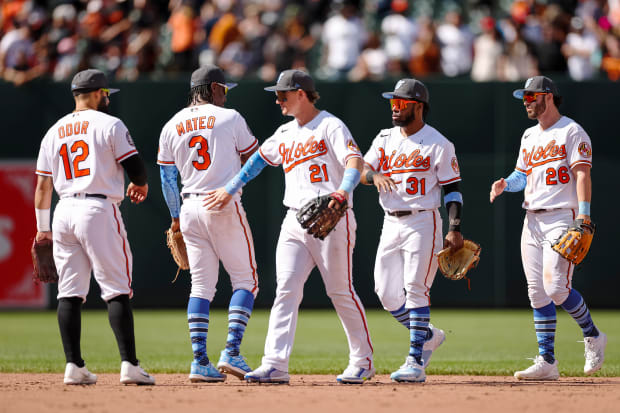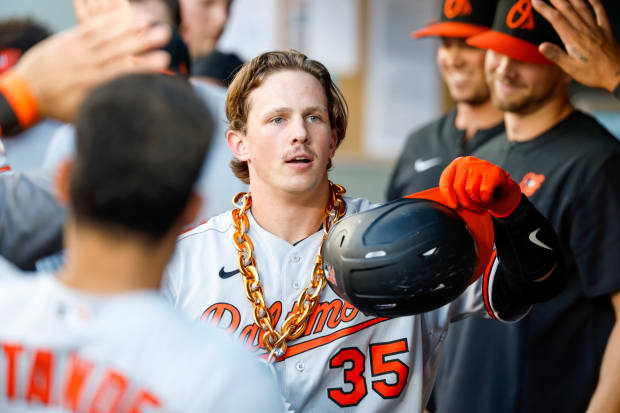View the original article to see embedded media.
Welcome to The Opener, where every weekday morning during the regular season you’ll get a fresh, topical story to start your day from one of SI.com’s MLB writers.
The Orioles finished June by dropping two of three to the Mariners. But it didn’t particularly matter: Even with that pair of losses, Baltimore ended the month in a way it had not in a long, long time.
By going 14–12 in June, the team posted a winning record for a single month of play. That’s something the Orioles had not done in nearly five years, since August 2017, and the record itself feels like as much of a backhanded compliment as any statement about winning possibly can. After all, there isn’t much interest in breaking the schedule down into monthly chunks for a team that wins regularly. This is the sort of number you look for when you’re in the business of searching for hope. It’s not the sort you look for when you’re actually, currently hopeful. For anyone to pull up this number in the first place is to gesture at the recent state of the franchise: If the goal here is to convey The Orioles played well this month, there is no choice but to be confronted by how that idea sits alongside Dear Lord, the Orioles have played truly, miserably badly for the last five years. But you take what you can get—teams share the statistics they deserve. And for the Orioles, this feels like the best one in a while, and maybe even the beginning of something like a turning point.

Scott Taetsch/USA TODAY Sports
To state the obvious: Five years is a long time! It’s a long time to go without a winning season. It’s longer still to go without the brief joy of a single good month—not great, certainly not remarkable, simply good. Just one month with more wins than losses. It is not at all unusual for even a very bad team to stumble backwards into one of those given enough chances. Yet these Orioles did not. They instead found a way to exist seemingly entirely outside the limits of success—deliberate success, of course, but accidental success, too. Their last five years simply have been too far gone for good luck. That has meant a lot of bad months. (The Orioles had nine in this period with a monthly winning percentage below .300.) It has meant a few truly dreadful weeks, with a lot of bad days, and precious few good ones. It has meant a roster that has turned over almost entirely: The only players on the team right now who remain from August 2017 are Anthony Santander and Trey Mancini.
This June, in other words, has been a long time coming.
A stretch like that is enough to create a new vocabulary for the fanbase. There is less talk of the season—there is not much to look forward to anymore in any individual season—and more of the window, a vague, amorphous period of contention that is closed at present but assured to open at some later date. There is less talk of performance and more of development. There are times where discussion of Double A begins to feel more reasonable than anything related to MLB. There are a whole slew of pithy little phrases designed to instill patience: Take the long view. Think about the big picture. Trust the process. Think of the inspirational signs one might find for sale in a Hobby Lobby, but make them somehow less evocative, and put them in the bleakest context possible. That is the language of five years of losing. It shifts the whole framework of fandom—it’s no accident that people are encouraged to think like a general manager, rather than like a fan, to get through a losing stretch like this—and it leaves something chillier and stranger and more practical in its place.
Watch the Orioles all season long with fuboTV: Start a 7-day trial today!
And then it ends. There’s enough young talent, enough development around the fringes and finally, just enough luck. For the Orioles, it came from a slugging Ryan Mountcastle and a strong outfield performance from Austin Hays and Cedric Mullins. It came from an effective bullpen effort led by Jorge López, Joey Krehbiel and Félix Bautista. It came from Adley Rutschman—from a player drafted out of all this losing now able to contribute to turning it around. It is not as simple as noting that Rutschman’s first full month in the majors was the Orioles’ first winning month in five years. But it doesn’t have to be much more complicated than that, either. If you’re looking for a sign of a new era, you’d be hard-pressed to do better than this one.

Joe Nicholson/USA TODAY Sports
A winning month is not enough of an accomplishment to actually be called an accomplishment. (The Orioles are still in last place in the AL East and look extremely likely to finish the season there.) But it’s something to hold onto—something that feels easy to simply appreciate as a fan. It’s something that doesn’t require an attempt to invoke the perspective of a general manager. It’s something that feels like moving forward.
All of which is to say: The Orioles lost their last game of June. But this month had already seen them win something bigger.







